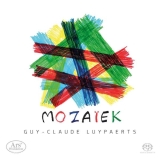Auf dieser CD stellt Guy-Claude Luypaerts sich und sein Werk sowohl als Komponist, als Flötist und auch als Dirigent vor. Im Doppelkonzert und im Werk Physalie ist die Flöte als Solistin zu hören. Physalie, die gefürchtete Qualle spanische Galeere, Gorée, die ehemalige Sklaveninsel vor Senegal sowie das Adagio haben als Idee jeweils den Bezug zum Meer. Im Concerto classique und in Gorée wird das Klavier zum Hauptprotagonisten der modern ausgerichteten Sprache von Guy-Claude Luypaerts Musik.
Im bei Jean-Pierre Rampal ausgebildeten Flötisten finden die Solopartien der Querflöte in Guy-Claude Luypaerts einen eloquent aufspielenden Sachwalter. Für das Doppelkonzert hat er sich mit der Harfenistin Anne-Sophie Bertrand die vielleicht namhafteste Mitspielerin für diese Aufnahme gesucht, die den Harfenpart mit ihrer gewohnten Fingerfertigkeit und dem musikalischen Feingefühl mitträgt. Die Klavierstimme in den beiden für dieses Instrument geschriebenen Stücken findet in Jean Dubé den Interpreten, der diesen Intensität und Zuwendung gibt, um sie ansprechend zu interpretieren. Bis auf Gorée bietet die Vogtland Philharmonie in allen Werken ihren ein wenig im Hintergrund klingenden Beitrag an, den sie stilvoll darzustellen weiß. Neben Guy-Claude Luypaerts sind noch Pascale Jeandroz beim Doppelkonzert und Nathanael Carre bei Physalie als Dirigenten zu nennen.
On this SACD Guy-Claude Luypaerts introduces himself and his work both as composer, as flutist and also as conductor.
In the double concerto and in the work Physalie, the flute is heard as soloist. Physalie, the dreaded jellyfish Spanish galley, Gorée, the former slave island off Senegal as well as the Adagio have as idea in each case the reference to the sea. In Concerto classique and Gorée, the piano becomes the main protagonist of the modern-oriented language of Guy-Claude Luypaert’s music.
In the flutist, trained by Jean-Pierre Rampal, the solo parts of the flute find in Guy-Claude Luypaerts an eloquently performing artist. For the double concerto, he has sought out perhaps the most renowned player for this recording in harpist Anne-Sophie Bertrand, who carries the harp part with her usual dexterity and musical sensitivity. The piano parts in the two pieces written for this instrument find in Jean Dubé the interpreter who gives them intensity and attention to make them appealing. With the exception of Gorée, the Vogtland Philharmonic offers its somewhat background-sounding contribution in all the works, which it knows how to present with style. In addition to Guy-Claude Luypaerts, Pascale Jeandroz in the Double Concerto and Nathanael Carre in Physalie should be mentioned as conductors.
























